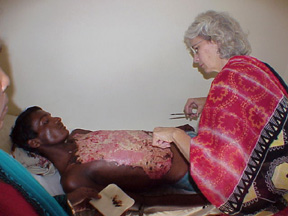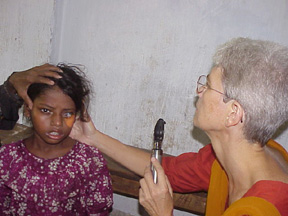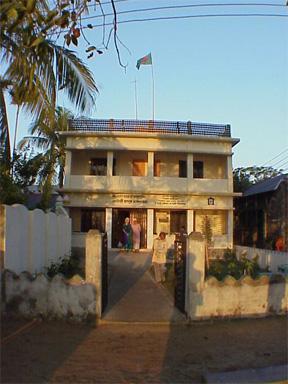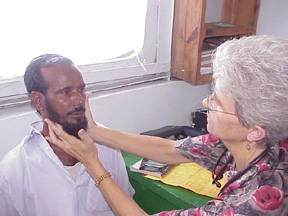 |
Sandra Borden cares for a burn patient in the hospital in Bangladesh. |
But nursing was her destiny.
The Gibbon, Neb., woman went on to build and staff a hospital in one of the poorest and most remote parts of the world. Last year, she received the UNMC College of Nursing Alumni Association Distinguished Alumnus Award for outstanding work in Bangladesh. The award is given to honor an alumnus for outstanding achievement in nursing.
Borden’s journey began in 1999 when she arrived in Bangladesh with only a stethoscope, blood pressure cuff and reflex hammer. During her first stint there, she traveled by boat to provide health care in extremely remote areas void of running water. Now, more than five years later, she’s raised money to build a hospital and hire and train staff. She’s also sent two girls from the area to nursing school.
Borden, who has used her education and training to save lives and improve the quality of life for thousands, knows nursing was the right choice for her.
Borden recalls taking care of a frail elderly woman during a double shift in an intensive care unit late one night. “At one point, the patient opened up her eyes and said, ‘You two still here? You must be very tired.’ From then on, I was hooked. I loved intensive care,” Borden said.
Her passion drove her to help patients for more than 25 years in intensive care units, a burn unit and an emergency room, and then in nursing administration, while living in Massachusetts, Idaho, Ohio and Nebraska.
After Borden graduated with a master’s degree in 1987 from the UNMC College of Nursing, she began teaching nursing at Central Community College in Grand Island. It wasn’t long before she began to miss the patient contact, so she went back to UNMC to pursue a post master’s certificate as a family nurse practitioner, which she received in 1996.
 |
Sandra Borden examines a young girl. |
Borden, 46, would finally realize her lifelong desire to work in a “very remote place.”
“I had three older brothers and thought of myself as a tough cookie,” Borden said. “I thought I could do well living and performing under rustic conditions.”
Borden fired off three e-mails. The site she and her husband chose was the first to respond to her e-mail: Bangladesh, a country the size of Wisconsin with a population of 128 million. The couple set out on a three-month adventure that would base them in Bangla Para, a village of 3,000 people.
Borden said when she sent the e-mail, she didn’t realize the project would be five hours away from the guy who sent her the e-mail. The extreme remoteness shocked her. There were no phones, no electricity, no running water, no stoves, no paper products, no motorized vehicles.
On a 42-foot boat sponsored by Rotary International, Borden provided health care to a poverty-stricken area along the Maghna River with a population estimated at 275,000.
Known as Dr. Sandra, she provided care while communicating through a translator. As the sole health care provider, she handled everything from minor cuts to second-degree burns, and even surgery. She had no laboratory in which to run diagnostic tests. There were antibiotics available but little else.
When she and colleagues wanted to get the word out about an upcoming cataract screening, they went up and down the river using a megaphone to broadcast the information. More than 3,000 people showed up over four days for the clinic, Borden said.
 |
The Hasuk Hospital in the early sunlight with the Bangladeshi flag flying from the roof. “Dr. Sandra” is standing in the doorway with Zahrul Haq, a local village leader who oversaw construction. Note the new power lines leading to the hospital. This is now the furthest upriver that electric power has reached in this remote part of the country. The hospital also has its own backup power generation system. |
In October 2000, the Hasuk Rotary Hospital (Hasuk, in Bangla, means “One Who Smiles”; 64 separate Rotary Clubs contributed to the project, thus the designation as the “Rotary” Hospital) opened its doors on Oct. 1, 2000.
Staffed with two Bangladeshi physicians, two nurse aides and a laboratory technician, it contained three exam rooms, a pathology laboratory, X-ray, labor and delivery room, minor procedures room and 11 inpatient beds.
With each trip back, Borden has expanded training and services at the hospital. This past July, she received funding to send two local girls to nursing school with the understanding they will practice in the village upon graduation. She also is raising funds to help another hospital buy an ambulance.
Her long-term goal is to open a nursing college in Bangladesh Para.
One of the biggest strides she has made is in educating physicians who practice in the hospital. “Only recently have physicians been taught to perform physical exams before prescribing medication,” she said. “Most medical practice in Bangladesh is verbal, the doctor does not examine the patient, he just writes out a prescription.”
 |
Sandra Borden examines a patient in Bangladesh. |
The hospital has been successful in sustaining itself financially with a fee-for-service system. Residents make the equivalent of about $1 a day and the seeing a physician for the first time costs approximately $20 (in U.S. currency).
“We recognize if we don’t make the institution self-supporting, it won’t stay open,” Borden said. “We have to break even. The institution has to become financially independent or it will die, because the funding always runs out. You can’t make it long term if you’re not self-supported.”
Residents are willing to pay because they consider their health valuable, she said.
Borden recalls a story about a patient with second-degree burns over his chest who was in a great deal of pain. The Bangladeshi physician didn’t want to administer the stronger and more costly pain medication because the man was poor and could not afford it. She insisted he speak with the man’s family and offer the choice of the better pain medication.
“The family did make the choice of the stronger pain medication,” Borden said. “He (the physician) was amazed. When the choice and cost was explained, the father said he would work in the fields extra days to make the extra money.”
The hospital’s presence in the village also has provided economic opportunities.
“At first, there were no tea shops in Bangla Para, but six months after the hospital opened, there were two in town. The third time I went back, there was a small stall where people could buy jewelry whereas before, the village wasn’t wealthy enough to support such a luxury. The presence of the hospital is generating economic activity,” Borden said.
The last time she visited, someone had opened the front area of their home as a “motel” for families of patients being seen in the hospital.
Each time Borden travels back to Bangla Para, she sees the progress of the hospital and the staff and knows she has directly and indirectly saved the lives of countless people.